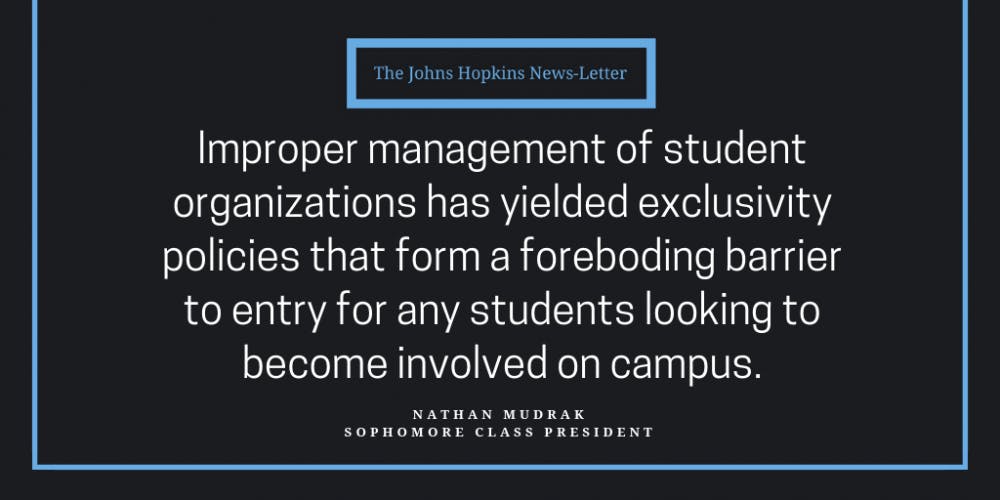** The opinions expressed in this article represent the views of the author, and do not necessarily reflect the views of SGA. **
I was troubled to read last week’s Opinions article “What I learned from student club rejections” by Keidai Lee. The article details Keidai’s difficult experience applying to student organizations here at Hopkins. His experience, and that of so many other incoming students who face rejection after rejection from on-campus student groups, is simply unacceptable. Your Student Government Association (SGA), of which I am a part, is entrusted with the power to regulate the majority of student organizations here on campus. We need to use it.
Several others on SGA concur, but we are a vocal minority. A few opposing votes mean nothing when all is determined by those of the majority, a majority that at times seems to think the only important agenda item is meeting adjournment. But it’s a dereliction of duty to know of the serious and systemic issues facing the University’s student organizations and not take action. SGA needs to take deliberate, sustained and transparent efforts to address the issue of selective student organizations now — this truly cannot wait.
I’m heartened by the actions SGA is starting to take, but I fear that many SGA members still do not fully grasp the gravity of the situation. Last month, for instance, SGA’s Committee on Student Organizations took the necessary step of announcing a temporary freeze on applications for new student organizations, as well as an audit for those currently established. However, the email announcing these steps neglected to explain the rationale for these policy changes, and did not give any indication that they understood how profound the changes they were demanding would be to some groups. Understandably, then, this notice came as quite a shock to many student groups, who fear an upset to the status quo of student organization management. SGA failed to adequately appreciate and address this legitimate concern. Because as Keidai’s article shows, for many groups the status quo must change.
At Hopkins, the status quo is the University community welcoming freshmen to campus by repeatedly denying attempts to join student organizations, and then questioning why the culture here can be so competitive. The status quo is banning juniors and seniors from applying to some organizations altogether. The status quo is being afraid to expand your horizons for fear that you won’t get into a group without prior experience. The status quo is having these exclusivity policies go unaddressed by the bureaucracy of a multi-departmental, non-standardized and simply confusing student organization management system, one whose design is absolutely foreign to our peer institutions.
This status quo cannot continue. Improper management of student organizations has yielded exclusivity policies that form a foreboding barrier to entry for any students looking to become involved on campus. Not only philosophically wrong, these policies are also illegitimate. Student organization selectivity, in most cases (performing arts groups and club sports are notable exceptions), is a violation of long-standing SGA and University policies. And yet the stress of student organization application season pervades our campus every year. The status quo has become so ingrained in Hopkins culture that SGA has failed to recognize how detrimental student organization mismanagement is to students. Selective, fragmented and unevenly-regulated student organizations do not connect the student body — they divide it.
It is clear, then, that SGA needs to seriously reform our student organization recognition and management processes. While their announcement was flawed, the audits truly are a great first step, but they do not go nearly far enough. We on SGA need to mandate that most student organizations, with few exceptions, be open to all who wish to join. We need to make this feasible by combining similar groups to increase capacity through pooled funding and increased organizational activity. We need to be more judicious in our consideration of applications for the creation and renewal of student organizations, ensuring that unnecessary selectivity does not receive our financial support. We need to invest the time to host listening sessions where we field student concerns about organizations, tailoring our reforms to the needs of the student body. Put simply, we need to do our jobs.
But we cannot expect student organizations to get on board with these changes before we ourselves do. SGA needs to grapple with a hard truth: Student organization mismanagement is damaging our campus culture, and our inaction will only further the injury.
We need to acknowledge the problem, work with student organizations to decide on and then mandate changes and, subsequently, help student groups in their transition to what needs to be a new standard for student organizations here at Hopkins. That’s the only way to ensure that the Class of 2023 is the last to ever experience the relentless rejections like those felt by Keidai Lee. Otherwise, we are complicit in the creation of a campus culture that values exclusivity over community.
Nathan Mudrak is a Molecular and Cellular Biology major and Bioethics minor from Kent, Ohio. He currently serves on SGA as Sophomore Class President and Chair of the Civic Engagement Committee.





